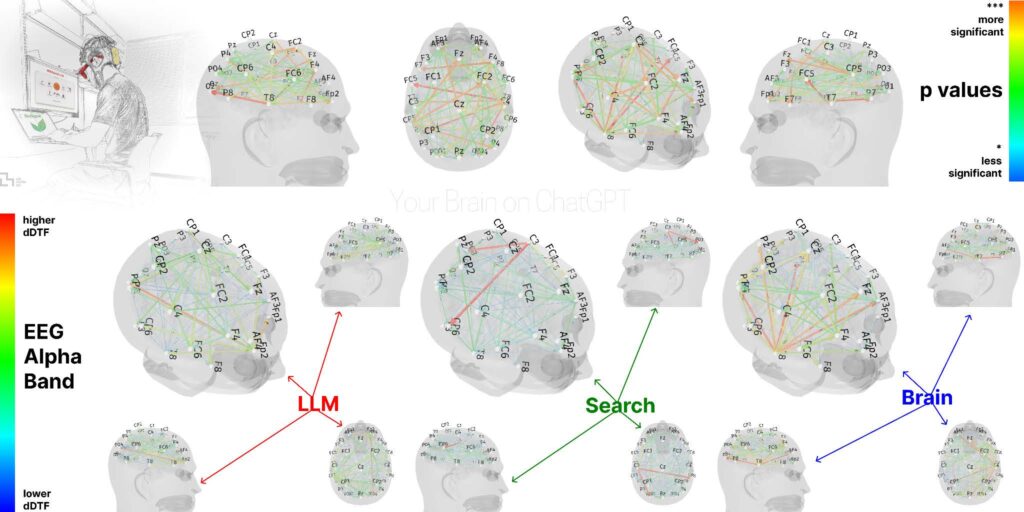
AI and Cognitive Debt: Is Artificial Intelligence Making Us Mentally Lazy?
It feels like a lifetime has passed since November 30, 2022—the day the first public version of ChatGPT launched. Since then, we’ve had time to observe how generative AI is truly shaping the way we think, learn, and create.
A recent study from the MIT Media Lab, titled “Your Brain on ChatGPT: Accumulation of Cognitive Debt when Using an AI Assistant for Essay Writing”, explores the impact of AI tools on complex intellectual tasks—specifically essay writing—by measuring neural activity through EEG, conducting in-depth linguistic analyses, and interviewing participants.
Let’s unpack what they found—and what it might mean for your brain.
_Myth #1: “AI saves time and improves results”
The study compared three groups: those who used ChatGPT, those who used a search engine, and those who relied solely on their own brainpower.
Surprisingly, the “no-AI” group showed higher brain activity, stronger memory retention, and a greater sense of ownership over what they wrote. On the other hand, the AI-assisted group produced more uniform texts but showed lower cognitive engagement and had trouble recalling or quoting their own writing.
_Myth #2: “AI helps you learn better”
Participants who used ChatGPT performed significantly worse when later asked to complete tasks without AI support. EEG readings showed reduced brain connectivity and a diminished ability to organize and retain information—suggesting a negative cognitive adaptation tied to AI dependence.
_Myth #3: “The more you use AI, the more efficient you become”
Yes, AI boosts short-term efficiency. But the research introduces a key concept: cognitive offloading. By outsourcing mental effort to AI, we may be “turning off” the neural circuits responsible for critical thinking, memory recall, and independent reasoning. Efficiency today could come at the cost of flexibility tomorrow.

_But Wait—Is the Study Even Reliable?
Like any research, this one has its limits. Some of the key caveats:
- Small sample size: Only 54 participants in the first phase, and just 18 in the final EEG study.
- Short timeframe: Four sessions may not be enough to identify long-term cognitive impacts.
- Methodological limitations: EEG offers useful signals but lacks the resolution of fMRI or other imaging techniques.
- Narrow focus: Essay writing is just one type of cognitive task—many others remain unexplored.
- User bias: Some participants may not have used ChatGPT effectively or creatively.
- No peer review (yet): The study is still awaiting formal academic validation.
So, while the results are intriguing, they’re far from conclusive.
_Takeaway: Use AI without “switching off” your brain
How can we integrate AI into our workflows without falling into cognitive debt?
- Use AI for brainstorming, research, and automatable tasks—but keep creative and critical thinking in your hands.
- Alternate AI-assisted work with cognitive workouts: read, write, code, solve.
- Remember: AI should augment your abilities, not replace them.
_The Future Lies in Hybrid Intelligence
The real takeaway from the generative AI era may be this:
The smartest approach is not to embrace or reject AI—but to collaborate with it. Human + machine. Logic + creativity. Code + context. Hybrid intelligence could be the key to unlocking our full potential.
_What About You?
Have you noticed changes in your own thinking or working style since using AI tools?
Drop your thoughts in the comments—we’d love to hear your story. Let’s build a collective reflection on how to use AI consciously, not passively.







